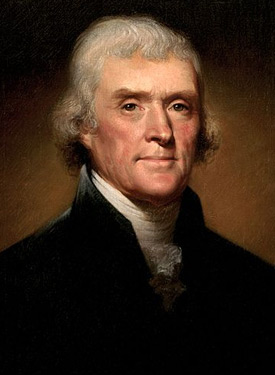
|
Thomas Jefferson (April 13, 1743 – July 4, 1826) was the principal author of the Declaration of Independence (1776) and the third President of the United States (1801–1809). He was an influential Founding Father, and an exponent of Jeffersonian democracy. Jefferson envisioned America as a great "Empire of Liberty" that would promote republicanism.[1]
At the beginning of the American Revolution, Jefferson served in the Continental Congress, representing Virginia. He then served as the wartime Governor of Virginia (1779–1781), barely escaping capture by the British in 1781. From mid-1784 Jefferson served as a diplomat, stationed in Paris, initially as a commissioner to help negotiate commercial treaties. In May 1785, he became the United States Minister to France. He was the first United States Secretary of State, (1789–1793). During the administration of President George Washington, Jefferson advised against a national bank and the Jay Treaty. With his close friend James Madison he organized the Democratic-Republican Party to oppose Alexander Hamilton's policies, especially his desire to create a national bank. He and Madison secretly wrote the Kentucky and Virginia Resolutions, which attempted to nullify the Alien and Sedition Acts and formed the basis of States' rights. Elected president in what he called the Revolution of 1800, he oversaw a peaceful transition in power, purchased the vast Louisiana Territory from France (1803), and sent the Lewis and Clark Expedition (1804–1806) to explore the new west. His second term was beset with troubles at home, such as the treason trial of his former Vice President Aaron Burr, and escalating trouble with Britain. Jefferson always distrusted Britain as a threat to American values; he rejected a renewal of the treaty that his diplomats had negotiated in 1806 with Britain and promoted aggressive economic warfare, notably the embargo laws, which were economically counter-productive and thus unpopular. He was in part responsible for the War of 1812 with Britain in 1812, which came after he left office in 1809.
Jefferson idealized the independent yeoman as the best exemplar of republican virtues, distrusted cities and financiers, and favored states' rights and a strictly limited federal government, though he suspended his qualms to buy Louisiana. Jefferson detested the European system of established churches and called for a wall of separation between church and state; he helped disestablish the Anglican Church in Virginia, and was the author of the Virginia Statute for Religious Freedom (1779, 1786). Jefferson sponsored Jeffersonian democracy; his Democratic-Republican Party, dominated American politics for 25 years.
Jefferson was born, and married into, prominent planter families; he was a loving husband to his wife Martha, who died in childbirth, and an affectionate father to their children. As a planter, Jefferson owned hundreds of slaves throughout his life; he held views on the racial inferiority of Africans common among Virginians for this period in time. After his wife died, Jefferson had an intimate relationship for nearly four decades with Martha's half-sister, his mixed-race slave Sally Hemings; they had six children and he freed the four surviving ones.
A leader in The Enlightenment, Jefferson was a polymath who spoke five languages and was deeply interested in science and political philosophy. While not an orator he was an indefatigable letter writer and was acquainted with many influential people in America and Europe. His views on slavery were complex, and changed over the course of his life,[2] though he was a critic of the international slave trade, and he presided over its abolition in 1807. Jefferson is typically rated by historical scholars as one of the greatest U.S. presidents.
|
|